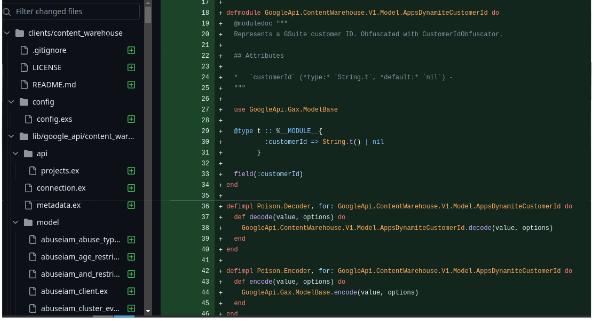Introduction
The world of SEO was sent into a frenzy in 2024 with a leak of what appeared to be a treasure trove of Google’s internal search ranking data. While the details remain somewhat hazy (and Google itself downplays the leak’s accuracy), these revelations offer valuable insights into how Google might evaluate websites. This blog dives into the key takeaways from the leak and provides actionable tips to optimize your SEO strategy for the current landscape.
The specifics of how the leak occurred are still under debate. Some speculate it involved disgruntled ex-employees, while others suggest a hack. Regardless of the source, the leak revealed over 14,000 ranking factors and features used by the Google search algorithm. While SEO veterans like Rand Fishkin and Mike King have analyzed the leak’s implications, Google maintains that it doesn’t reflect their current ranking systems entirely.

Source: GitHub
The Core Discoveries from the Google Search Algorithm Leak & SEO Strategies
1. User Experience is King: Click-through rates and time spent on the page are critical search engine ranking factors.
SEO strategy: Keep users engaged with clear navigation, intuitive design, and valuable content.
2. Content Quality Evolves: High-quality content remains essential, but informative and engaging content is favored.
SEO strategy: Move beyond basic keyword stuffing and create content that goes the extra mile (think interactive elements and diverse formats).

3. Backlinks Evolve: Backlinks are valued for the user traffic they drive, not just the number of links.
SEO strategy: Focus on acquiring high-quality backlinks from reputable sources in your niche. Tools like Google Search Console can help you disavow harmful links.
4. The Rise of Machine Learning: The leak suggests Google’s algorithm leverages machine learning (NSR) to understand the semantic meaning behind content.
SEO strategy: Cater to this by focusing on context and user intent while crafting your content strategy.
5. Focus on Freshness: Regularly updated content is crucial for maintaining relevance and ranking.
SEO strategy: Schedule content reviews and updates to keep your website fresh and valuable to users.
6. Holistic Site Health Matters: The Google search algorithm leak highlights the importance of consistent quality across all sections of your website (Host NSR and Site Chunks).
SEO strategy: Ensure high-quality content and user experience throughout your entire website.
PageRank Variants
The Google search algorithm leak unveiled several variations of Google’s Page Rank algorithm, each serving a specific purpose:
PageRank_NS (Nearest Seed): This variant of the Page Rank algorithm focuses on understanding document content and how pages are interconnected. It helps Google categorize low-quality pages and niche topics.
Toolbar PageRank: Though officially retired in 2016, the leak suggests variations like “rawPagerank” and “pagerank2” are still in play. Interestingly, a system called “NavBoost”, leverages click data from the supposedly defunct Toolbar PageRank alongside Chrome user data to influence search engine rankings. This emphasizes the importance of user engagement metrics for your SEO strategy.
Critical Components of Google Search Algorithm
NavBoost: As mentioned earlier, NavBoost uses Chrome user data to assess how important a webpage is. This means optimizing for user engagement.
SEO strategy: Improve click-through rates and time spent on a page through clear navigation, intuitive design, and strong calls to action.
NSR (Neural Search Ranking): This machine learning system analyzes the semantic meaning behind the content to understand its context and relevance.
SEO strategy: To appease NSR, create rich, well-structured content, that goes beyond basic keyword stuffing. Think informative guides with diverse elements like interactive maps, videos, and user reviews.
Content Quality Metrics
ChardScores: This mysterious metric seems to predict overall site and page quality based on various factors, including user engagement and content quality depth.
SEO strategy: Maintain high-quality content across your site and strive for user engagement. Imagine a financial news website with in-depth articles, expert interviews, and interactive charts – that’s the kind of content quality ChardScores might favor.
Page Quality (PQ): This metric, likely powered by a large language model, estimates the effort put into content creation. The message here is clear: Google values human-created content with originality and depth.
SEO strategy: Detailed DIY home improvement tutorials with original photos and videos would likely score highly on the PQ scale.
Image and Content Quality
Image Quality Signals: Google isn’t just looking at keywords anymore. The leak highlights the importance of image quality through metrics like usefulness, presentation, and engagement.
SEO strategy: High-quality, original images that complement your content quality will likely perform better than stock photos.

SEO strategy: Regularly review and update your content to keep it fresh and valuable.
Managing Site Content and Structure
Host NSR and Site Chunks: This system evaluates your entire website by analyzing sections or “chunks.” In simpler terms, consistent quality across all sections of your website matters. For example, ensuring high-quality journalism across all categories on a news website will increase reliability and thus traffic.
Removing Low-Performing Pages: The Google search algorithm leak highlights the concept of “Content Pruning,” which involves identifying and deleting outdated or irrelevant pages that bring down your overall site quality.
SEO strategy: Regularly audit your content and remove low performers to concentrate link equity and user engagement on your best content.
Backlinks and Mentions
Toxic Backlinks: The Google search algorithm leak confirms Google’s crackdown on low-quality backlinks.
SEO strategy: Focus on acquiring high-quality backlinks from reputable sources in your niche. Utilize tools like Google Search Console to disavow any harmful links that might be negatively impacting your rankings. Here high quality not only means that the websites have high DA, but a ton of other factors like relevancy, location, traffic, age, etc. add to the quality of the website concerning the linking domain.
Entity Mentions: The Google search algorithm leak suggests that online mentions of your brand or website (think industry blogs, and news articles) can influence your search rankings similarly to backlinks.
SEO strategy: Build a strong online presence and reputation to encourage mentions on relevant and high-traffic websites. If you’re an e-commerce website then the reviews of your products matter and how much they are talked about on the web.
Conclusion
The 2024 Google search algorithm leak has provided invaluable insights into the complex mechanisms behind search rankings. Despite Google’s claims that the leaked data isn’t entirely accurate, the information reveals essential trends and priorities in SEO. By focusing on user experience, content quality, backlinks, machine learning, and site health, you can enhance your SEO strategy to align with these emerging insights. Regularly updating content, maintaining high-quality images, and managing your site’s structure and backlinks are crucial. Ultimately, these strategies will help you stay ahead in the competitive landscape of search engine optimization
Bonus Tip: Remember, Google’s search algorithm is complex and constantly changing. While this blog post provides a snapshot based on the leaks, staying updated on SEO best practices through reputable sources is crucial for long-term success. To improve your website traffic with expert SEO strategies visit www.epiphanyinfotech.com.
Sahil Thakur, a Digital Marketing Expert at Epiphany Infotech, specializes in On-page, Off-page SEO, and Amazon marketing & management. With a proven track record of boosting traffic and revenue for global websites, Sahil is passionate about all things digital marketing. Outside work, he stays updated on the latest trends in digital advertising.

